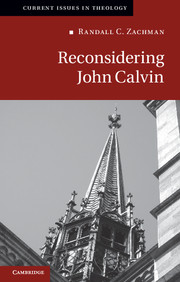Book contents
- Frontmatter
- Contents
- Abbreviations
- Introduction
- 1 The beauty and terror of the universe
- 2 The bond and critique of all social union
- 3 The one elect people of God
- 4 The restoration of Israel by gospel and law
- 5 The comfort and the challenge of love
- 6 Hoping for all others, fearing for myself
- Conclusion
- Index
4 - The restoration of Israel by gospel and law
Calvin and Ezra the Scribe
Published online by Cambridge University Press: 05 June 2012
- Frontmatter
- Contents
- Abbreviations
- Introduction
- 1 The beauty and terror of the universe
- 2 The bond and critique of all social union
- 3 The one elect people of God
- 4 The restoration of Israel by gospel and law
- 5 The comfort and the challenge of love
- 6 Hoping for all others, fearing for myself
- Conclusion
- Index
Summary
This chapter will attempt to explore an answer to the questions posed in the previous chapter by appealing directly to Calvin and the Bible, to see if we might be able to develop a positive theological understanding of Israel and the Jews based on these sources. I will set forth a trajectory in Calvin that I hope will allow us better to understand the covenant made with Israel on its own terms, without mediating this covenant through Christ, so that Christians can acknowledge the integrity of this covenant on its own terms, based on our own Scriptures. As we have seen in the previous chapter, the impressive attempts made by Calvin and Barth to unite the covenant with Israel with the work of God in Christ wind up succumbing to oppositional forms of thinking. No matter how positively Israel is understood, it is inevitably brought under the shadow of the cross, and is understood in terms of the categories of human sin and divine wrath. Is there a way of understanding the history of this covenant that is less toxic, less oppositional, less vengeful, if you will? You can tell that Calvin and Barth have a hard time restraining themselves. They will say positive things about the Jews after the death of Christ, but then they will appeal to the Jewish refusal to believe in Christ and the Gospel, and see the Jews as under judgment, under wrath, with no blessing, with no hope for the future. If you look at the history of Christianity from the very early days until now, this is the tendency one sees, a combination of grudging generosity followed by incredible vituperation. Is there a way out of this dynamic that allows us to see God’s relationship to the Jews on its own terms, without appealing to Christ and the Gospel, but based on the Scriptures that Christians claim as their own? Can we come to an understanding of the blessing of God in the Jewish community in terms that Christians can recognize as fully consistent with their Scriptures, and which Jews can recognize as consistent with their own self-understanding?
- Type
- Chapter
- Information
- Reconsidering John Calvin , pp. 91 - 119Publisher: Cambridge University PressPrint publication year: 2011



